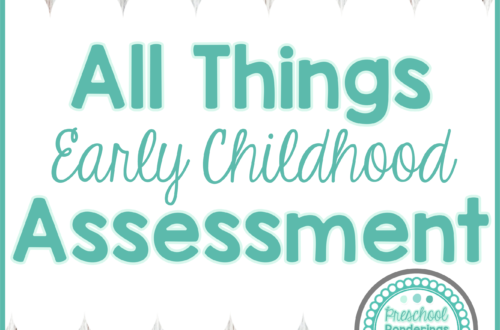Preparing for preschool conferences
April is almost here, and in my world April means parent-teacher conferences. Since I’m getting ready, I thought I would share my assessments process and all of my materials with you, get ready, this is going to be a long one!
I start with three different assessments – yes, three.
First, the portfolios. Each of my students has a digital portfolio, you can read more about them in this post and this post. Their digital portfolios are shared with their parents, so they can view them any time, but for their last conferences before kindergarten I print everything and put it in a binder. These portfolios include a page for each early learning standard, along with some kind of evidence that the child has mastered (or been introduced to) the standard. The evidence is either a photo of the child participating in an activity, or a photo of a work sample. These portfolios are cumulative, so I add to them each month, and by the end of their preschool career they are complete.
The second assessment that I use is a standards-based developmental checklist. This includes each standard, and a space to record whether the child is proficient in this standars, beginning to understand the standard, or has not yet been observed attempting the standard. These checklists are also cumulative, and are revisited each year. It is a great way to show the child’s growth throughout the preschool years.
The third assessment I use is a skills-based assessment. The standards-based assessment is technical, and while it makes sense to an education professional, most parents find it lengthy and a little complicated. The skills based assessment shows parents exactly what they want to know – Can their child write his or her name? Do they know their shapes? How many numbers can they recognize? What upper and lowercase letters do they know? Can they rhyme? These skills are meaningful to parents, so I complete a skills assessment for each of my students prior to conferences. I also like to do these in the middle of the year, it helps me understand what skills each student needs to focus on for the remainder of the year. Both of these are included in the conference binder for parents to review.
Before every conference I email copies of each document to the parents so that they can review them before coming in. This saves time because I don’t have to review all of the assessments with them. I also generally include a detailed explanation of each assessment, so that they know what they’re seeing.
The other thing that I lie to do before each conference is write down a short list of skills (no more than 2 or 3) that each child needs to work on, along with a couple of very specific activities that families can do together to help practice these skills.
To be completely honest, parent teacher conferences stress me out – but doing all of these things (yes, a ton of prep – I know) helps me feel confident that I know exactly what each child is capable of. This makes it easier to talk to parents about their child’s development because I have the evidence to support what I am telling them. In the end, the one thing that helps the most is to remember that parent-teacher conferences are supposed to be a positive experience, and as long as I’m doing everything in my power to make sure that happens, then I’ve done my job.






